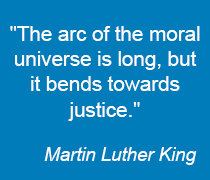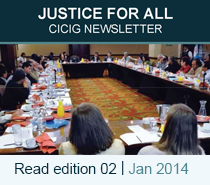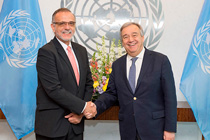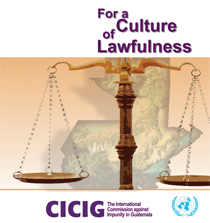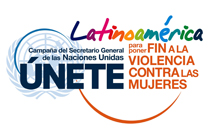Guatemala ended its 36-year armed civil conflict in 1996 with the signing of the Peace Accords, which led to the start of an ambitious process to create an inclusive, democratic society. Twelve years later, however, the country is plagued by widespread common and organized crime and fettered by a legacy of ineffective justice sector institutions. As in many other post-conflict countries, implementation of the Peace Accords has been hampered by weak institutions, a lack of political will and increasing violent crime.
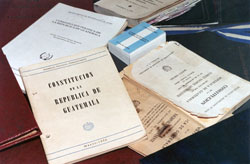 There are approximately 6,000 homicides every year in Guatemala, including the widespread killing of women and children; only 2% of these crimes ever go to trial. In addition, recent high-profile crimes have confirmed the infiltration of organized criminal networks into the State of Guatemala. These groups pose a grave menace to the rule of law and threaten to undermine the progress arduously achieved by the country in the democratization process. The State faces a serious challenge in its work to ensure the rule of law and protect fundamental human rights, such as its citizen's right to life and physical integrity.
There are approximately 6,000 homicides every year in Guatemala, including the widespread killing of women and children; only 2% of these crimes ever go to trial. In addition, recent high-profile crimes have confirmed the infiltration of organized criminal networks into the State of Guatemala. These groups pose a grave menace to the rule of law and threaten to undermine the progress arduously achieved by the country in the democratization process. The State faces a serious challenge in its work to ensure the rule of law and protect fundamental human rights, such as its citizen's right to life and physical integrity.
A particularly complex issue arises from the continuous actions of the illegal security groups and the clandestine security structures, which evolve from the State's counterinsurgency structures and, at present, emerge and operate as networks similar to those of the Mafia. These networks are deeply involved in illegal economic activity and violent crime, and they also have a strong influence in various state institutions. In the In the 1994 Comprehensive Agreement on Human Rights in Guatemala, the Government of Guatemala committed to "combat any sign" of "illegal security forces" and "clandestine security machinery". Nonetheless, the United Nations Verification Mission in Guatemala (referred to as MINUGUA), as well as other humans rights organizations and the Ombudsman for Human Rights, continues to report the existence of such groups and links them to threats received by human rights defenders and justice sector officials who investigate political crimes committed during the war. These groups, in a more general sense, are also involved in perpetrating violent crimes. In particular, institutions from the justice sector and the security sector have been penetrated and undermined by these Mafia groups, limiting the State's ability to disband them.
After a wave of attacks against human rights defenders in 2002, a coalition of human rights NGOs launched a drive to persuade the Government to establish a body to investigate the activities of these groups. In early 2003, the Government of Guatemala asked the UN Department of Political Affairs (DPA) to provide assistance for the development of a mechanism to help the State investigate and prosecute members of these groups. Following a series of discussions and a technical exploratory mission, the United Nations signed an agreement with the Government of Guatemala on January 7, 2004, which provided for the establishment of the Commission for the Investigation of Illegal Groups and Clandestine Security Structures (CICIACS). However, the proposed agreement created widespread controversy and faced strong opposition in Congress. Finally, the Constitutional Court's opinion was requested regarding a number of points, and it ruled that certain parts of the agreement violated the Constitution's delegation of exclusive criminal prosecution powers to the Public Prosecutor's Office.
The Government of Guatemala redrafted the agreement to remove all the unconstitutional issues raised by the Constitutional Court (CC), and it approached the Department of Political Affairs at the end of 2005 with a petition to negotiate the establishment of a commission with a revised mandate. In addition, a new brief was handed over to the Secretary General on May 31, 2006. The discussions with the Department for Political Affairs continued, and the agreement to establish the International Commission against Impunity in Guatemala (CICIG) was signed with the United Nations on December 12, 2006 and ratified by the Congress of Guatemala on August 1, 2007. The agreement entered into force on September 4, 2007 when the State of Guatemala notified the UN that it had completed the internal proceedings to approve and ratify the agreement. Ten days later, the Secretary General of the UN appointed Commissioner Carlos Castresana Fernández to lead the CICIG.


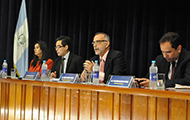
 There are approximately 6,000 homicides every year in Guatemala, including the widespread killing of women and children; only 2% of these crimes ever go to trial. In addition, recent high-profile crimes have confirmed the infiltration of organized criminal networks into the State of Guatemala. These groups pose a grave menace to the rule of law and threaten to undermine the progress arduously achieved by the country in the democratization process. The State faces a serious challenge in its work to ensure the rule of law and protect fundamental human rights, such as its citizen's right to life and physical integrity.
There are approximately 6,000 homicides every year in Guatemala, including the widespread killing of women and children; only 2% of these crimes ever go to trial. In addition, recent high-profile crimes have confirmed the infiltration of organized criminal networks into the State of Guatemala. These groups pose a grave menace to the rule of law and threaten to undermine the progress arduously achieved by the country in the democratization process. The State faces a serious challenge in its work to ensure the rule of law and protect fundamental human rights, such as its citizen's right to life and physical integrity. 